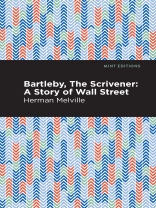Bartleby is a newly-hired scrivener who initially produces great work but slowly reduces his output, declining assignments and responding with: ‘I would prefer not to.’ Despite his poor performance, his boss struggles to reprimand the eccentric character.
A Manhattan lawyer decides to hire a third scrivener called Bartleby to help manage his growing workload. Yet, the quiet unassuming man soon becomes a source of contention. At first, Bartleby is an active member of the team yet one day he refuses to complete an assignment, setting an unusual precent. He continues to refuse work, which confuses the lawyer and frustrates his peers. Bartleby’s passive attitude is indicative of a larger issue his boss has yet to uncover.
Herman Melville delivers a simple story about a man who follows his own path. He chooses not to engage with work or society as a whole. It’s an examination of passive resistance in a modern world fueled by compliance and consumerism.
With an eye-catching new cover, and professionally typeset manuscript, this edition of Bartelby, The Scrivener: A Story of Wall Street is both modern and readable.
Since our inception in 2020, Mint Editions has kept sustainability and innovation at the forefront of our mission. Each and every Mint Edition title gets a fresh, professionally typeset manuscript and a dazzling new cover, all while maintaining the integrity of the original book.
With thousands of titles in our collection, we aim to spotlight diverse public domain works to help them find modern audiences. Mint Editions celebrates a breadth of literary works, curated from both canonical and overlooked classics from writers around the globe.
Sobre el autor
Herman Melville (1819-1891) was a prominent American novelist in the nineteenth century. He was one of eight children born into a military family with strong ties to the Revolutionary War. As a young man, he held odd jobs including a seaman, which would inspire his greatest literary works. Melville was an avid reader whose first story Typee: A Peep at Polynesian Life (1846) was loosely based on his own experiences. Yet, it was Moby Dick, published in 1851, that is considered his great American masterpiece.












